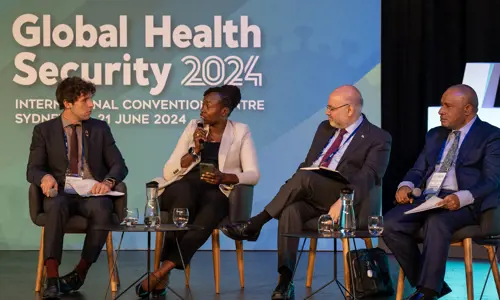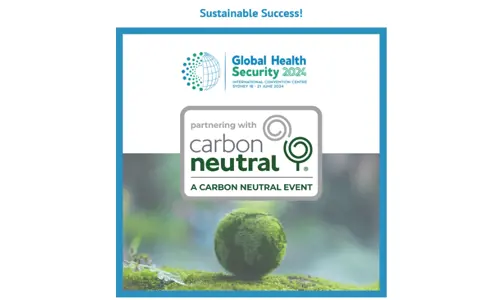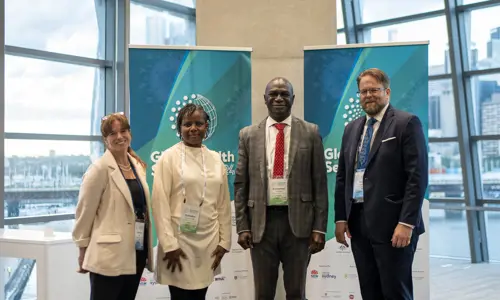Achieving Carbon Neutrality at the Global Health Security Conference 2024


Led by the Global Health Security Network, the Global Health Security Conference 2024 (GHS Conference), attracted 1,237 delegates. Held at ICC Sydney from 18-21 June 2024, and at Taronga Zoo on 22 June 2024, this conference serves as a prime example of how events can achieve carbon neutrality through dedicated sustainability initiatives.
Background: The GHS Conference was the first recipient of BESydney’s BEGreen Sustainability Program, an initiative by BESydney to support the greening and carbon offsetting of international association events held in Sydney between 2024 and 2026. The grant aims to ensure that events incorporate environmental sustainability processes, are held at sustainably certified venues, and measure and offset their carbon footprint.

Sustainability Initiatives: The GHS Conference successfully achieved carbon neutrality by implementing several key sustainability initiatives:
- Measuring Greenhouse Gas (GHG) Emissions: The event's total GHG emissions amounted to 4,059.42 tonnes of carbon dioxide equivalent (t CO2-e), with the majority (99.9%) of emissions stemming from attendee travel, accommodation, and purchased goods and services.
- Carbon Offsetting: To offset these emissions, the Global Health Security Network (GHSN) purchased a total of 4,060 carbon credits from projects strategically aligned with their organisational purpose, ensuring that the event's net emissions were effectively reduced to zero.
- Sustainable Venues: The event was held at ICC Sydney, a venue recognised for its sustainability features, including a 6-star Green Star Communities certification and a Gold LEED certification. ICC Sydney worked closely with GHSN to minimise consumption and maximise waste avoidance through a series of venue sustainability initiatives. Taronga Zoo is Eco Certified at the highest level with an Advanced Ecotourism certification for its operations with minimal impact on the environment and provides educational opportunities for their visitors.

Consultancy for Carbon Footprint Measurement: The GHSN engaged a sustainability consultant, Carbon Neutral, to measure the event's carbon footprint. This consultancy provided expertise in accurately assessing the GHG emissions, ensuring that all aspects of the event's environmental impact were accounted for. The benefits of using a consultant included:
- Accurate Measurement: Ensuring precise calculation of the event's carbon footprint, which is crucial for effective carbon offsetting.
- Expert Guidance: Providing professional advice on sustainability practices and carbon offset strategies.
- Credibility: Enhancing the event's credibility by involving an independent, certified consultancy.

Financials: The total cost of achieving carbon neutrality for the GHS Conference was just under $34,000, including consultancy fees for measuring the carbon footprint and the purchase of carbon credits. BESydney contributed 50% towards these costs through the BEGreen Sustainability Program. This amounted to $27.27 including GST per delegate to offset costs. Note the size of an event’s carbon footprint will vary significantly depending on the event attendance. Costs are also heavily dependent on the type of carbon credits purchased to offset emissions. Before purchasing carbon credits, they must be verified to ensure they result in genuine emissions reduction (such as ACCU’s).
Impact and Learnings: The GHS Conference team was significantly upskilled in implementing sustainable event practices because of the BEGreen program. The organisers are now committed to ensuring that their future events continue to strive towards greater sustainability and less impact on the environment.

Conclusion: The success of the Global Health Security Conference 2024 in achieving carbon neutrality demonstrates the feasibility and benefits of incorporating sustainability into event planning. By following the example set by the GHSN and leveraging sustainability initiatives, other association organisers can also make their events more sustainable and carbon neutral, thereby contributing to global efforts to combat climate change.
“Thank you for providing the BEGreen Sustainability Program for the Global Health Security Conference 2024. Your support was crucial in helping us achieve our goal of making our large international event, which encourages participation from 89 different countries, carbon neutral - something we have always aimed for but couldn't have achieved without this grant. We are deeply committed to sustainability, and this grant allowed us to take meaningful steps towards reducing our environmental impact. We are grateful for your partnership and look forward to future opportunities to work together.
Samantha Tanner
Chief Operating Officer, Global Health Security Network

Key Benefits for Organisers:
- Enhanced Reputation: By achieving carbon neutrality, organisers demonstrated their commitment to environmental sustainability, which can enhance their reputation and attract environmentally conscious attendees and stakeholders.
- Leadership in Sustainability: The GHS Conference set an example for other events by integrating sustainability into their planning and execution. This leadership can inspire other organisers to adopt similar practices, contributing to broader environmental goals.
- Upskilled Staff: Undertaking the GHG Emissions measurement process enabled GHS Conference team to gain valuable skills in implementing sustainable event practices. This upskilling can benefit future events and contribute to long-term sustainability efforts.
- Aligned with Organisational Purpose: The sustainability initiatives were closely aligned with the GHSN's mission to improve global health security. This alignment ensured that the event's sustainability efforts supported their broader organisational goals.
- Positive Impact on Public Health: By addressing environmental sustainability, the GHS Conference contributed to global health security. Climate change and environmental degradation are critical health challenges, and reducing the event's carbon footprint directly supported efforts to protect public health.
- Long-term Commitment: The success of the GHS Conference in achieving carbon neutrality has committed the organisers to ensuring that their future events are also carbon neutral. This long-term commitment can lead to more sustainable practices across the industry.


